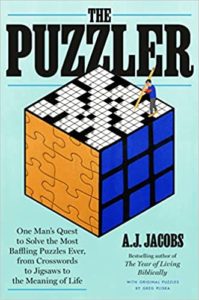
The Puzzler
By A.J. Jacobs
368 pages
Published Apr. 26, 2022 by Crown Publishing Group
If you like puzzles. Or English. Or humor. Or music. You may like this book. I liked it because it was chock full of interesting facts and worthy speculations about all of those things.
It’s a bathroom book. And by that I mean it can be enjoyed in short “sittings.”
The author, A.J. Jacobs, is what they call an “immersion journalist,” a writer that takes a year or so to explore an interesting topic and then recounts his experiences. He did it before with The Year of Living Biblically and Know It All. He calls them lifestyle experiments.
Here, the deep dive is puzzles. Crosswords, anagrams, rebuses, jigsaws, mazes, chess problems, math and logic, ciphers/secret codes, visuals (think “Where’s Waldo”), cryptics, riddles. He wants to know what makes them so satisfying.
He studies the history. He researches the data. He interviews the experts. He then spends countless hours trying to solve puzzles of every kind. And all the while, he speculates, humorously and sometimes philosophically, about why he’s spending his time doing this.
Here are a few bits from one section of the book, on Anagrams:
Anagrams were originally seen as divine hidden messages from the gods…. According to The Puzzle Instinct by psychologist Marcel Danesi, Alexander the Great once had a dream about a “satyr,” the mythical character that is half-man, half-goat. Alexander was troubled by the dream. What did it mean? He asked his soothsayers, who wisely pointed out that, in ancient Greek, the word for “satyr” is an anagram of “Tyre is yours.” (Tyre was a city Alexander’s army had surrounded.) Alexander took this as a green light from the gods. He invaded Tyre and made it his. Admittedly, Alexander might have found another excuse to invade if not for anagrams. He was a big fan of invading.
In the 17th century, King Louis XIII of France appointed a man named Thomas Billen to be his Royal Anagrammatist at a salary of 1,200 livres a year. Billen’s entire job was to fashion sycophantic anagrams, rearranging the letters in royal names to create flattering descriptions.
The Victorians also liked their obsequious anagrams. Lewis Carroll famously created this one out of Florence Nightingale: Flit on, cheering angel.
But anagrams can also be insulting. In 1936, The New York Times reported that mother-in-law is an anagram for Woman Hitler.
Critical Reception
* “[A] weirdly fascinating new book… a romp, both fun and funny. Jacobs explains, in a way I never could, how at various points in our lives puzzles can save us.” (The New York Times)
* “Humans are obsessed with puzzles, and A.J. Jacobs is obsessed with figuring out why. Of all the gifts he possesses as a writer, his second-greatest is his ability to make you think and make you laugh at the same time. In these delightful pages, you’ll find a clue about what his greatest gift might be.” (Adam Grant, author of Think Again and host of the TED podcast WorkLife)
* “A barrel of monkeys’ worth of fun.” (Kirkus Reviews)
* “Ridiculously entertaining.” (Booklist)
About A.J. Jacobs [bold]

A.J. Jacobs is a journalist and lecturer who has written four bestselling books – including Drop Dead Healthy and The Year of Living Biblically – that blend memoir, science, humor, and a dash of self-help. A contributor to NPR, The New York Times, and Esquire, among other media outlets, Jacobs lives in New York City with his family.
Click here to read an article he wrote about the joy of playing with words.
